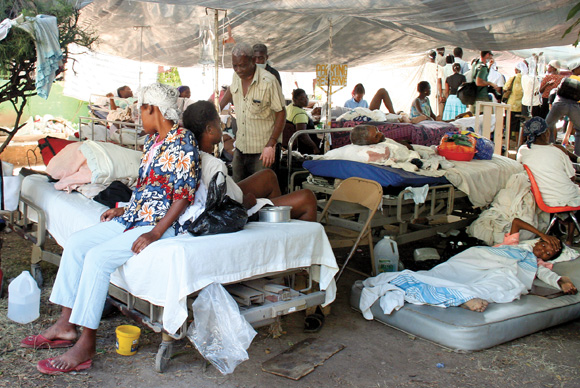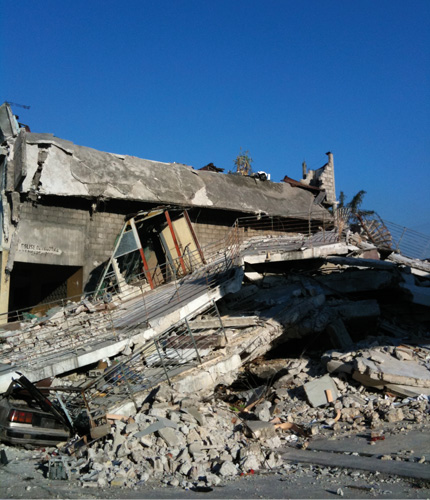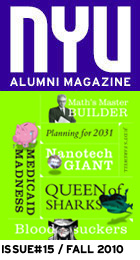medicine
The Obstacles of Aid
NYU doctors recall days on the ground in Haiti after the 2010 earthquake
by Sally Lauckner / GSAS ’10
Last January, the world watched in disbelief as hundreds of thousands of Haitians were left dead or severely injured after a devastating 7.0 magnitude earthquake ripped through the Caribbean island. For Patricia Poitevien, the horrifying images of felled buildings and smoky rubble were personal—her parents are Haitian and still live there. After Poitevien, a pediatrician at NYU’s Langone Medical Center, ensured that her family was safe, her next instinct was to organize a relief effort. “It was a no-brainer,” she says. “I felt that was the very least I could do for my home country.”
On January 22, just 10 days after the quake struck, Poitevien was part of an interdisciplinary team of seven NYU medical professionals—including orthopedic surgeons, an anesthesiologist, and a nurse with war experience—who arrived in Haiti to assist with urgent health needs. Among them was Fritz François (WSC ’93, MED ’97,’07), a Haitian-born physician and assistant professor in the department of medicine, who left Port-au-Prince for the United States when he was 10 and had never returned. While François could recognize major landmarks, he was shocked to discover his home country almost entirely transformed. The scene that greeted him as the plane touched down was worthy of a postapocalyptic novel; in the distance the ground was teeming with bright flames and dense smoke swallowed the air. Save for a smattering of generators, the island was without electricity.
For both Poitevien and François, the conditions were emotionally and physically draining. L’Hôpital Général, the country’s largest hospital, was severely damaged and the threat of another violent aftershock destroying the building led hospital personnel to set up tents for treating patients outdoors (only the operating room and the intensive-care unit remained inside). The adjacent nursing school had collapsed, trapping people under rubble, and François recalls the putrid scent of decaying bodies as he walked past the debris. Due to a scarcity of running water and a lack of medicine, children were dying from highly treatable conditions such as dehydration or an asthma attack. “That was particularly upsetting,” Poitevien says. At night the team returned to a campsite for relief workers organized and run by Partners in Health, a global nonprofit organization.

Hanging over the physical destruction were more daunting questions about Haiti’s future. How would an already-downtrodden nation rebuild not only homes and hospitals but the spirit of its people? One of François’ biggest regrets is that the NYU coalition didn’t have a mental-health professional on the trip. In the immediate aftermath, people who suffered shock but didn’t have any visible ailments were overlooked, he explains. Six months after the quake, Partners in Health reported that many Haitians suffered from psychological trauma, including hallucinations, insomnia, and severe anxiety. The organization estimates that it will spend only 1.8 percent of its total budget for Haiti on mental health and psychological support.
While the NYU coalition has no concrete plans to return to Haiti together, Poitevien intends to make a second, solo, relief trip to the island. Meanwhile, François is representing NYU on a U.S. Department of Health & Human Services-sponsored committee to rebuild the infrastructure of Haiti’s health-professions training. The country is a major exporter of health-care workers, so it’s also crucial to supply incentive for future medical workers to stay and practice in their country. “If we are going to sustain this effort, then we have to involve the next generation so they can take over,” François explains.
Despite their worries about the earthquake’s enduring legacy on the island, Poitevien and François were both inspired by how they saw the islanders responding to the disaster. “We have a difficult history and a difficult present,” Poitevien explains. “But Haitian people pick themselves up and keep going no matter what. Watching people go to the marketplace and put their wares on tables and picking up debris from their old homes was very touching for me. That’s what is so remarkable about the country.”
“If we are going to sustain this effort, then we have to involve the next generation,” says Haitian-born NYU physician Fritz François.







